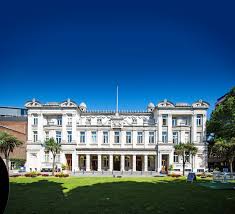MS COLLEGE
Queen Mary University of London
About the institution
1. History and Background
- Queen Mary University of London has a rich history that dates back to 1785 when it started as the London Hospital Medical College. Over time, it grew through a series of mergers with other institutions, including Queen Mary College in 1989, which led to the university becoming known as Queen Mary University of London.
- Today, Queen Mary is one of the Russell Group universities, a group of research-intensive universities in the UK.
Why Study at Queen Mary University of London?
Strong Academic Reputation
Location in London
-
The university is located in Mile End, East London, giving students access to all the vibrant opportunities the city offers while maintaining a campus environment away from the hustle of Central London.
-
London is a global hub for culture, business, finance, and innovation, providing students access to world-class museums, galleries, theaters, businesses, and networking opportunities.
Support for International Students
Work Placement Opportunities
-
Queen Mary University of London offers numerous opportunities for students to gain practical experience through internships, placements, and work-based learning. These opportunities help students build valuable networks and enhance their employability.
-
Many programs have integrated work placements or industry partnerships that allow students to apply their learning in real-world settings.
Modern Facilities
-
The university has invested heavily in its campus infrastructure, offering state-ofthe-art facilities such as modern lecture halls, seminar rooms, libraries, research labs, and student accommodations.
-
Queen Mary’s Blizard Institute and Centre for Advanced Biomedical Imaging provide cutting-edge resources for students studying health and biomedical sciences.
Wide Range of Courses
-
Queen Mary offers a broad spectrum of undergraduate and postgraduate courses across disciplines such as:
- Arts, Humanities, and Social Sciences
- Law and Politics
- Medicine and Dentistry
- Engineering and Computer Science
- Business and Economics
- Science and Technology
- The university provides over 250 undergraduate and 100 postgraduate programs to suit a variety of academic interests and career goals.
Career and Employability Services
-
Queen Mary provides a dedicated Careers Service that helps students with job searches, placements, career advice, CV writing, and interview preparation. The university has excellent connections with top companies, both in the UK and globally.
-
The QM Careers and Enterprise Centre supports students in launching their careers, networking, and finding employment opportunities in their field of interest.
Affordable Living Costs (Compared to Central London)
1. While living in London can be expensive, QMUL’s location in East London offers more affordable living options compared to Central London. The area is wellconnected by public transportation, allowing students to enjoy London without the high accommodation costs often associated with the city center.
Supportive Student Community
- Queen Mary University of London fosters a friendly, inclusive, and supportive environment for students. The Students' Union offers a range of societies, clubs, and events that promote socializing and personal development.
- There are also support services available for academic assistance, mental health, and well-being, ensuring that students thrive in both their studies and personal lives.
Global Recognition
Queen Mary is known for its global reputation, ranking highly in both UK and international rankings. Its degrees are recognized and respected worldwide, making it a great choice for students wishing to pursue careers in international fields. Undergraduate Courses and Duration
1. Duration of Undergraduate Courses
Undergraduate Courses with a Year in Industry/Placement: Some programs offer an option to take a year-long industrial placement or work placement, making the course duration 4 years.
- Example: Business Management (with Placement), Engineering (with Placement), Computer Science (with Placement), etc.
Undergraduate Courses with a Year Abroad: Many undergraduate programs offer a year abroad as part of the course, extending the duration to 4 years.
- Example: Modern Languages (with Year Abroad), International Relations (with Year Abroad), etc.
Medicine (MBBS) and Dentistry (BDS): The MBBS (Medicine) and BDS (Dentistry) programs at QMUL have a duration of 5 years. These are more intensive programs with clinical training included.
Popular Undergraduate Programs and Their Duration
-
LLB Law: 3 years
- Business Management: 3 years (or 4 years with a Placement Year)
- Mechanical Engineering: 3 years (or 4 years with a Placement Year)
- Biology: 3 years (or 4 years with a Placement Year)
- Computer Science: 3 years (or 4 years with a Placement Year)
- English Literature: 3 years · Medicine (MBBS): 5 years · Dentistry (BDS): 5 years
Postgraduate Courses and Duration
1. Duration of Postgraduate Courses
Postgraduate Research (PhD): Research-based programs such as PhDs typically last 3-4 years, depending on the subject area and the research project.
Postgraduate Programs with Professional Practice: Some postgraduate courses, particularly in fields like business, law, and medicine, may include a work placement, internship, or professional practice, which could slightly extend the duration, depending on the course structure.
Popular Postgraduate Programs and Their Duration
· MSc Computer Science: 1 year (Full-time)
-
MA History: 1 year (Full-time)
- LLM Law: 1 year (Full-time)
- MSc Finance: 1 year (Full-time)
- MSc Engineering (e.g., Mechanical, Electrical): 1 year (Full-time)
- MSc Public Health: 1 year (Full-time)

